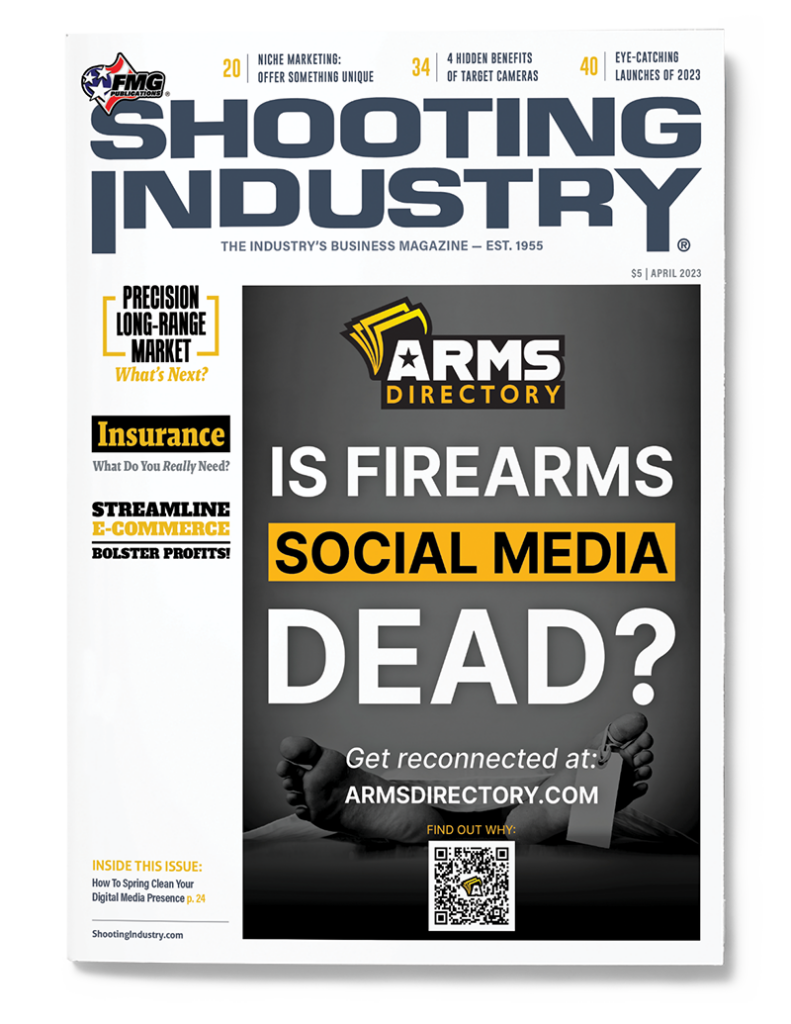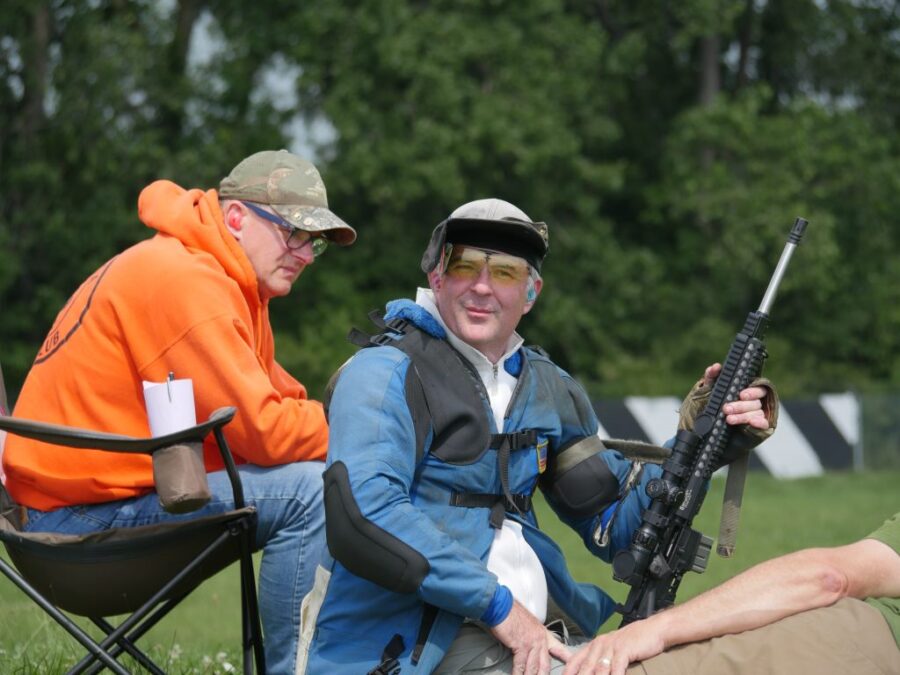Get Covered!
6 Burning Questions To Answer Your Insurance Needs
If you own (or plan to own) and operate any type of firearms-related business, do you know what insurance is needed? Do you know where to find it? Do you know all the details? Do you know what you don’t know? With the current climate, is it still possible to get firearms-related insurance? Many questions like this will arise as you plan this new business.
John Paulk with Outdoor Sports and Recreation Insurance and Joseph Chiarello with Joseph Chiarello & Company Insurance have both worked in the field for a long time and offer their expert insight and advice.
1. Who Needs Insurance?
The business owner not only needs general liability for incidences you typically think of, such as someone falling in the store. Coverage is also needed for a variety of activities the business is involved in.
To begin with, Paulk explained insurance is for more than just firearms dealers.
“They’re also manufacturers, distributors, retailers and range operations. It’s a very diverse group of people,” said Paulk. “There are so many pieces. Let’s say you have an FFL retailer and he’s got a gunsmith and the gunsmith is assembling guns and let’s say he’s got an engraver and he’s engraving the name on the gun. Once he does that, he becomes a manufacturer. So it’s important to understand it’s not all that simple.”
Paulk continued, “This is why when they do an application, they need to tell their agents every little thing they’re going to be doing. If they leave something out and then they have a loss, they have no coverage.”
“It’s important to make sure you’re up to date and the numbers to rebuild and replace are current.”
Ron Hagan, Founder
Best Shot DE • Lewes, Del.

Ron Hagan, founder of Best Shot DE in Lewes, Del.,heartily recommends
attending industry events to get connected with the best providers.
“Getting involved with the right organizations and making sure you do your research
makes it a smooth transition to finding the right one that fits your needs,” he said.
2. Why Do You Need So Much Coverage?
“Remember something — and this is very simple — you can be sued for anything, anytime, anywhere, anyplace, for any amount of money and it doesn’t matter whether it’s a valid claim. It’s about what they’re passionate about,” advised Paulk.
Chiarello agreed: “I think it’s important to go with a carrier and insurance company familiar with the firearms industry. A lot of insurance companies will tend to just settle a claim and you really don’t want to do that because it’s like every other insurance. Once you start having some claims and some big numbers on record, it becomes more and more difficult to buy. We work with a very select group of attorneys who handle all of our work for us. They’ve worked with the firearms industry for a very long time and are very familiar with this area. Without the right defense counsel, you can end up settling a claim you shouldn’t.”
3. Where Do You Find Insurance?
Insurance considerations should be part of your business plan, and this is where Paulk believes the NSSF can be of great assistance. The NSSF can help owners develop a good business plan, provide information on demographics for a trade area, training on topics such as OSHA requirements, suicide prevention and more.
“NSSF does a tremendous service for their members,” praised Paulk. “So, let’s start from the very beginning: They need to find an agent who understands this business; it’s the first thing.”
A business owner can search online for companies, but both Paulk and Chiarello recommend the NSSF as an excellent starting place.
4. What Are You Forgetting?
When asked what type of coverage most people don’t think about, Paulk contends it’s Workers’ Compensation. He added Business Interruption is another important piece often not considered: It’s extremely helpful if a business has a fire or some other damage and can’t operate for an extended amount of time. You’ll want this coverage until your business is fully restored.
To Chiarello, the most common type of coverage overlooked is on a building a dealer is renting.
“The landlord will want to see they’re on there as an ‘Additional Insured’ to protect themselves,” said Chiarello.
He added that another important aspect of insurance his company offers is assisting an owner if they’re involved in something like an ATF compliance audit.
“We have some coverage built into our policy to help clients get ready for that meeting,” he shared. “Say the ATF comes out and does an audit and the books don’t add up to the inventory. We’ll help you get ready and put together a response explaining what happened and why it’s not going to happen again. This is basically what the ATF wants to hear. And if you need to have an accountant or a lawyer with you to help with the meeting, it is covered as well.”
Helping clients prepare for a good response is key, Chiarello noted.
“We find it makes a lot more sense, in the long run, to help people prepare,” he asserted. “This is usually enough for them to keep their FFL, which is good for us too because it means they stay in business.”
5. What Does The Future Hold For Insurance?
A lot has changed in recent years with boardroom virtue signaling limiting insurance options for firearms-related businesses.
“It’s hard to say what the future holds because certain insurance companies have left the market altogether, while others have said they were going to leave and then changed their mind. But the insurance market overall is struggling right now for a number of different reasons,” observed Chiarello. “Some enter thinking they’re going to make a lot of money, but they don’t. Costs are increasing everywhere. Insurance companies all over the board are struggling.”
Paulk also confirmed a lot of providers have turned their back on the firearms industry, making it increasingly difficult to get the necessary coverage.
“I’ve been talking about the issue with insurance in this industry. Back about seven years ago, I started down the path of trying to put together a program for the insurance of the firearms industry. I had 189 insurance companies turn me down because of the word ‘firearms.’ When I started writing insurance policies, there were 11 companies and now there are only three,” Paulk laments.
Chiarello also admits it is in a large part due to the social climate.
“I just think it’s so wrong,” he said. “These are legal businesses; they aren’t doing anything wrong.”
6. What Do Business Owners Say About Obtaining Insurance?
Ron Hagan, founder of the recently opened Best Shot DE in Lewes, Del., agrees with the advice to utilize the expertise of the NSSF, as well.
“The NSSF industry events were critical in helping me locate an insurance provider I could work with,” he acknowledged. “I think getting involved with the right organizations and making sure you do your research makes it a smooth transition to finding the right one that fits your needs. The consultant we used was also instrumental in connecting us with the right provider.”
Hagan said there were really no surprises in the process of obtaining insurance due to the expertise of the consultant.
“I knew what I was getting into and what to expect,” he added.
The Shootist Gun Range in Englewood, Colo., experienced the importance of insurance. After suffering a devastating fire in 2019, owner James Peterson has sage advice on the topic.
“Insurance saved our life and not having it would have been detrimental. We would have lost everything. As it was, we ended up paying for a lot of it out-of-pocket. We quadrupled our policy afterward. We had the policy for five years before the fire, but the cost of everything had risen so much, replacement costs were three times what they were back then. So, it’s important to make sure you’re up to date and the numbers to rebuild and replace are current,” he advised.
The Bottom Line
While making your business plan, it’s necessary to find a knowledgeable agent and start working with them right away to cover every aspect you can think of. Don’t wait until the last minute, because quotes can take some time to get in place and you may need them to get a lease or equipment.
Work with professionals to get exactly what’s needed to protect your business and every single aspect involved with it. Don’t go cheap thinking it will save money, because it may ultimately cost much more in the long run. Then remember to periodically review it and keep it updated.





